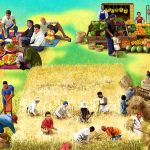Supporting Farmers and Food Systems: How Crowdfunding Can Address Funding Challenges for Agricultural SMEs in Africa
The agricultural sector employs over 70% of the working population in Africa, making it a cornerstone of economic progress and livelihood development. But the sector continues to be adversely affected by containment measures to curb the spread of COVID-19, which have reduced the spending power of the public and hence the demand for agricultural products. The disruption of agri-food value chains has also had devastating impacts, with the lack of revenues making sourcing for raw materials, product development and even meeting monthly overheads a daunting challenge.
Consequently, this financial strain — combined with market inefficiencies that existed even before the pandemic — could mean the end of operations for vulnerable farmers and small and medium enterprises (SMEs) in the agri-food sector. Most have limited or no options in terms of insurance, credit and risk management, making them very prone to financial collapse.
Funding challenges in agriculture: is crowdfunding a solution?
To address these challenges, agricultural value chains need to be bolstered by finance to ensure uninterrupted supplies and guarantee food security. But despite noticeable progress in the financial sector in recent years, such as the gradual growth of rural banks and cooperatives and enhanced access to fintech services among farmers, most SMEs and smallholders are still handicapped by the existing requirements for accessing formal credit facilities. Their major constraints include limited assets to serve as collateral, poor management skills (such as the lack of business plans), and limited record-keeping, which reduces their ability to provide lenders with information on their cash flows and financial assets. Faced with a global pandemic that seems to have no imminent end in sight, these already disadvantaged SMEs and farmers now face a greater challenge to survive.
There is thus an urgent need to protect Africa’s food systems. To help meet this need, digital financial approaches are rapidly growing — and among these approaches, crowdfunding models are at the frontier. In a depressed economy, particularly in countries with less developed financial systems, crowdfunding may turn out to be a viable means of financing for agricultural SMEs and smallholder farmers.
The crowdfunding model isn’t entirely new to the continent: In Africa, many people use it to raise funds for social causes from friends, family and members of the public. But it is rarely used to crowdsource capital for business ventures. However, despite the relative novelty of business-focused crowdfunding, the increased internet penetration and proliferation of mobile phones in Africa — coupled with strong interpersonal networks — make it feasible as a capital-raising mechanism.
Impact investment through crowdfunding
The crowdfunding model is one element of our work at 2SCALE, an incubator program that manages a portfolio of over 60 public-private partnerships driving inclusive agribusiness strategies across 10 countries in sub-Saharan Africa. In response to the issues described above, we are currently facilitating crowdfunding for inclusive agribusiness SMEs. This initiative aims to leverage the solidarity between SMEs and their national communities, and it has already delivered notable results. For instance, in October 2020, over 20 agribusiness SMEs in Mali, Nigeria and Kenya — which each had an existing relationship with 2SCALE — were able to raise over $50,000 in just a single one-month campaign, with 2SCALE matching an additional $20,000+. These SMEs generated the funds by mobilizing the social networks of their founders, management and employees. To encourage these efforts, 2SCALE provided a financial bonus of $2,000 to companies that raised at least 50% of their targeted amount. The most successful crowdfunding campaign per country also received a cash reward of $1,500. The proceeds raised were plowed back into the businesses to promote these inclusive agribusiness ventures.
The program showed that, with a viable pitch, a business can create a snowball effect and spur donations from a range of supporters, enabling it to access funds that can solve the working capital challenges it faces. The crowdfunding model provides an opportunity for common people to pool funds for unique and sustainable projects, ultimately democratizing charitable initiatives and bringing their benefits to previously excluded businesses.
One of those businesses is Mhogo Foods, whose founder and CEO Elizabeth Gikebe ran a successful crowdfunding campaign last year, raising $7,000 out of a target of $8,000. Looking back, she says that it was surprising for her when people started to contribute, given how unfamiliar the concept of business-focused crowdfunding is in her native Kenya. Months later, this woman-led enterprise serving over 2,000 cassava farmers has used the funding to set up a solar dryer in western Kenya: This dryer will significantly increase the production capacity of the smallholder farmers who supply the company with raw produce. The partnership between Mhogo Foods and 2SCALE aims to provide 25,000 base-of-the-pyramid consumers in Kenya’s urban and peri-urban areas with access to safe, nutritious and affordable foods.
After the success of our first phase of crowdfunding, we’ve seen growing interest among agricultural SMEs to leverage this approach to raise funds for their businesses. Earlier this year, 2SCALE organized the second phase of our crowdfunding program — this time with over 50 SMEs from Kenya, Nigeria and Mali participating. Many of these companies have made huge strides toward meeting their goals, and the success of their crowdfunding campaigns may further popularize this capital-raising model in Africa. For information on the participating SMEs — or to learn more about the program and its impact — please visit the 2SCALE crowdfunding website.
Esther Mweru is the Communications Specialist and Jerry Sellanga is a Communications Coordinator at 2SCALE.
Photos courtesy of 2SCALE.
- Categories
- Agriculture, Finance, Technology



